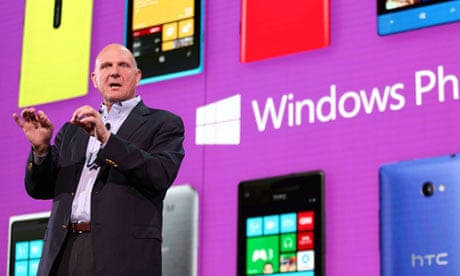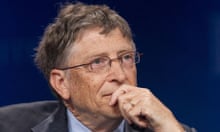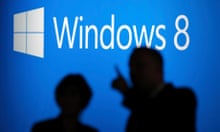When Microsoft boss Steve Ballmer first revealed his software for the touchscreen world in February 2012, he said he was "betting the company" on it.
There were "no compromises" made in replacing the time-honoured desktop with Windows 8's colourful tile-based interface, Ballmer insisted.
But just six months after the official release, Microsoft – which relies on Windows licences for about half its profits – is getting ready to make compromises to key aspects of the software. It comes after its leap into the tablet computing future was described as "confusing" (or worse) by new users and has been blamed for plummeting sales of PCs, which had their sharpest drop on record in the first three months of this year, down 14%.
The biggest expectation is that the update to Windows 8, codenamed Blue and due within a few weeks, will revive the start button that had been familiar to users for 17 years but which was removed from the new version.
If correct, it will be a U-turn as momentous in its way as Coca-Cola's abandonment of "New Coke" in 1985 just three months after its launch following consumer protests.
Tami Reller, promoted to head Microsoft's Windows division after Ballmer ejected former chief Steve Sinofsky in November, announced on an internal Microsoft blog on Monday that Blue will be "an opportunity for us to respond to the customer feedback that we've been closely listening to" since the October launch.
"Are there things that we can do to improve the experience? Absolutely," Reller told the Associated Press. "There is a learning curve [to Windows 8] and we can work to address that."
The principal challenge for experienced users of Windows is the total absence of a Start button, familiar since 1995 as the place with all their programs and shortcuts stored in a huge list. Windows 8 instead introduces a layer of giant "tiles" over the traditional desktop.
But users find that perplexing – so much so that one of the bestselling apps on Windows 8 has been Stardock, which lets the user add the start button back in, and ModernMix, which lets tile apps run on the old desktop. That will have given Reller pause – along with the fact that sales of Windows PCs have shrunk for the past four quarters, declining sharply year-on-year by 11.4% between January-March to about 74m.
The blame for that was put squarely at Sinofsky's door by Bob O'Donnell of the research company IDC: "At this point, unfortunately, it seems clear that the Windows 8 launch not only failed to provide a positive boost to the PC market, but appears to have slowed the market," he said.
"The costs associated with touch have made PCs a less attractive alternative to dedicated tablets and other competitive devices."
However Reller gave no other hints about what's coming, or when. That's a problem in itself, said Richard Doherty of Envisioneering, a market research company: "they had the Vista misstep in 2007 [when an earlier Windows update alienated users] and this is more of that. They're telling people 'take it or leave it', and consumers have been leaving it."
Even so analysts don't think the Start button will return in exactly that form.
At Gartner, a rival research company, vice-president Michael Silver says Microsoft "didn't listen to customers who were pointing [the start button problem] out in testing. They could have had a middle ground, but chose not to – I think Sinofsky made sure it was pretty difficult to make major changes if he didn't want them."
Sinofsky and Ballmer are understood to have argued over such flexibility – which saw the junior leave quickly. Even so Silver thinks the changes will only offer the chance to start the machine purely in the desktop mode, bypassing the tiles; he doesn't expect the Start button back.
Meawhile the traditional PC business is merging rapidly with that of tablets and smartphones – in which Microsoft is barely visible. IDC said that while PC sales were plunging, tablet sales in the first quarter of 2013 hit 49.2m, overtaking desktop-based PCs. Smartphones passed that mark long ago, having outsold PCs since the end of 2010, and in developing countries they are becoming many peoples' first computing device. But Microsoft's Windows Phone has less than 5% share worldwide, compared with 70% for Google's Android and 20% for Apple's iPhone. Microsoft only has about 1% of the tablet market, according to IDC.
This week Microsoft co-founder and chairman Bill Gates defended Windows 8: "It takes the benefits of a tablet and the benefits of a PC, and it's able to support both of those – so if you have [Microsoft own-brand tablet] Surface, Surface Pro, you've got that portability of a tablet but the richness of a PC in terms of the keyboard, Microsoft Office of a PC," he said. "Microsoft is trying to gain share in what has been dominated by the iPad-type device."
Paradoxically Microsoft's stock is presently trading at a six-year high, after the hedge fund ValueAct Capital took a $2bn stake at the end of April, with its chief executive Jeffrey Ubben remarking "We see Microsoft's consumer strategy challenges, and say 'who cares'."
Reller was also able to announce that Microsoft has now sold 100m Windows 8 licences in the six months since it was launched, matching the previous figure for Windows 7 at the same time in 2010. Though she didn't explain it, business customers are buying Windows 8 licences but actually install the older Windows 7 – with its familiar start button.



Comments (…)
Sign in or create your Guardian account to join the discussion